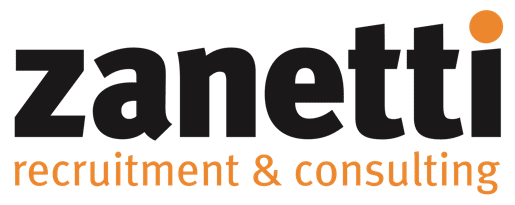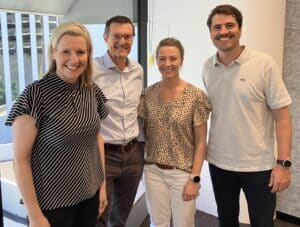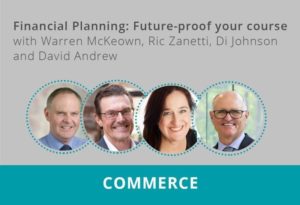True when the phrase was first coined in the 1800’s by Jean-Baptiste Alphonse Karr and still true today. The Richest Man in Babylon written in the 1920’s leverages 4000-year-old parables that are still relevant. And now after 35 years of exposure to the financial services industry, I find within significant change, certain principles still hold true. Information that is not just relevant at a point in time, but are general principles that exist and have relevance in perpetuity.
Having recently reflected on a “body of research” Zanetti Recruitment & Consulting completed in conjunction with Griffith University in 2016 and close to the completion of more valuable market research regarding new entrant pathways, there seems to be a consistency worthy of consideration. Below are two exerpts from the paper and my further comment.
Excerpt 1 – Graduate transition into financial planning has been found to be difficult and expensive for both students and prospective employers:
“It may take years for a new graduate to become worth more than an entry-level wage; therefore, the employer pays a wage in excess of the value actually contributed by the graduate. In addition, employers incur costs in the form of in-house training, certification and licensing, supervision, and turnover. Employers hope to recoup these expenses when the graduate becomes more productive by paying a wage that is lower than the value of the employee to the firm at that time, typically within two to three years. It is at this point that many employees leave their original mentors for greener pastures with employers more willing to recognize the current value of their newly acquired skills. This tendency leaves the graduate’s mentor less willing to hire inexperienced candidates in the future. (Goetz et al., 2005, p. 232- 233). This cycle of turnover in the early stages of a financial planning career may be improved through the implementation of ‘career path’ focused recommendations”. Dianne Johnson, M. B. (2016). Industry Demand for Financial Planning Graduates. Financial Planning Research Journal, 108.
There is no doubt that graduates will be necessary for the future of financial planning. It’s also evident that financial planning business owners are investing heavily on the presumption that a graduate will be retained within their business for more than a few years. Based on current engagement with firms, there can be a reluctance to engage where the practice is lacking scale. Therefore businesses desire to attract staff with existing experience and a more immediate impact within the role. The trade-off? Less development but a greater expense. Arguably, without the development of well educated, professional, engaged young people, there will be a scarcity of experienced staff available in future. This in itself, could increase the cost to attract and retain quality staff within the industry.
Excerpt 2 – There are significant opportunities for financial planning firms that are able to adapt quickly to the new professional business ethos and environment:
“This report details the results of a financial planning survey with a particular focus on results regarding staff growth intentions of financial planning firms and their expectations for new entrants. We find our respondents are positive about the future with 85.1 per cent of the sample signalling an intention to grow staff numbers with new entrants (two-thirds with graduates) over the medium term. This signals a generally positive outlook, but also a shift in response to the increasing expectations in terms of new entrant qualifications as the industry moves towards professionalism”. Dianne Johnson, M. B. (2016). Industry Demand for Financial Planning Graduates. Financial Planning Research Journal
Being 4 years post this research, the statements are still true. With current uncertainty, there are fewer employment opportunities and without a crystal ball, we are unsure as to when this will change. But we are cognisant of the following: Middle and low-income earners will find it increasingly hard to seek and obtain advice other than subsidised models (i.e. vertically integrated such as superannuation fund) and the scope of advice to this cohort will be limited. There are less financial planning firms today and there will be less in the future. Business scale will continue to be increasingly important to deliver profitable advice. The pendulum will swing on the punitive nature of compliance (increasing cost) but it may be some time yet. Businesses that attract higher-income earning households and business client profiles that can afford to pay fees for advice will increasingly have opportunities that reflect the future of advice (OR models offering sophisticated digital technology aligned to human engagement – may not be face to face).
Thirty-five years ago, the industry was largely focused on product sales. I learnt from some excellent needs-based salesmen (and I use the word men because there were very few women in the industry. There is still a lack of gender diversity in the financial advice ranks). Now we are at the frontier of the future of advice.
What is still the same?
- Australian’s need advice
- The financial system will continue (even if it’s structurally different)
- The principles of regular saving, compound interest and time will continue
- The complexity associated with our tax system and the regulatory environment will continue
- Investor behaviour is not always rational and the need for continuous education, a structured plan and to be held accountable on an ongoing basis is key for many to be financially independent.
The current environment (and I don’t just mean COVID) hurts, it’s hard and it’s having an impact on all Australian’s at every level (consumers, business owners and new entrants to the industry/profession). It’s easy to be a cynic.
I’m buoyed by how resilient the industry/profession is and I’m convinced we collectively will find solutions to ensure there is a future for advice. Is there really any option?





